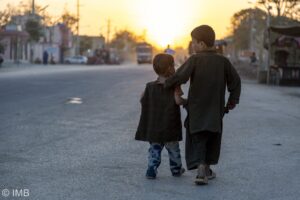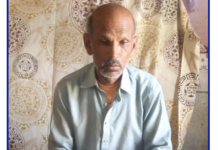Witney, England (ANS) – Afghanistan is now the most dangerous place in the world to be a Christian, according to figures released by Open Doors in their 2022 World Watch List (WWL).

Afghanistan replaces North Korea at the top of the list after 20 years – this despite persecution also rising there this year.
The WWL, which records levels of persecution and discrimination across the globe*, found that over 360 million Christians suffer high levels of persecution and discrimination for their faith – a rise of 20 million from last year.
The number represents one in seven Christians worldwide. This year records the highest levels of persecution since the first List was published 29 years ago, and in recent years has plotted a steady increase.
Afghanistan – the brutal reality
The report paints a shocking picture of life for Afghanistan’s small, deeply hidden, Christian population, suggesting that:
- Christian men are facing almost certain death if their faith is discovered.
- Women and girls may escape death but may be married to young Taliban fighters who want “spoils of war”. When women and girls are raped, they will be trafficked.
- The incoming Taliban government gained access to recordings and reports that helped to identify Christians inside the country. When located, they were often detained, to identify further networks of Christians, before finally being killed.
- Taliban fighters are actively tracking down Christians from existing intelligence, even going door-to-door to find them.
- Much of the Christian population has fled to rural regions or refugee camps in neighbouring nations – all of which feature in the WWL as countries hostile to Christians.
Emboldened: the ‘Talibanisation’ of West Africa and beyond
Meanwhile, the fall of Kabul has fuelled a new mood of invulnerability among other jihadist groups worldwide. The groups believe that they will not face serious opposition from the West for their expansionist agendas and are exploiting nations with weak or corrupt governments. Its effects are not yet fully felt in the WWL 2022 reporting period (1 October 2020 until 30 September 2021) but there are strong signs it is set to further boost violence in countries such as Nigeria (#7), Mali (#24), CAR (#31), Burkina Faso (#32), Niger (#33) and DRC (#40) – countries with already high levels of violence.
The current jihadist expansion has moved Nigeria’s former Head of Naval Intelligence, Commodore Kunli Olawunmi to describe a concerted strategy of ‘Talibanisation’ in Nigeria by the jihadist groups – a deliberate, religiously-motivated degrading of security and order in which state actors and tribal groups are complicit [1]. In Nigeria a total of 4,650 Christians has been recorded as killed – 79 per cent of the worldwide total.
We can see a similar strategy by jihadist groups and their supporters elsewhere in the region.
- Sub-Saharan Africa, already the place where violence against Christians is highest, has faced further steep rises in jihadist violence, with fears that a significant part of the region faces destabilisation.
- Social order in Mali (#24 on the WWL) is deteriorating fast, with fears it could become the ‘next Afghanistan’ with insurgency spilling into neighbouring countries Niger and Burkina Faso.
- Both the Democratic Republic of Congo (DRC), plagued by the Alliance of Democratic Forces, and the Central African Republic (CAR) have joined Nigeria in the top ten list for levels of violence.
The continuing violence and destabilisation in these areas look set to have serious consequences as hundreds of thousands more around the world flee their homes for safety.
“The rise of Afghanistan to the top of the World Watch List is deeply troubling,” says Henrietta Blyth, CEO of Open Doors UK and Ireland. “Apart from the incalculable suffering it represents, it sends out a very clear message to Islamic extremists everywhere: ‘You can continue your brutal fight for influence, unchecked.’ Factions like Islamic State and Alliance of Democratic Forces (ADF) now see their goal of an Islamic caliphate – once thwarted in Iraq and Syria – as, once again, achievable. The cost in human lives and misery this new-found sense of invincibility is causing, and will continue to cause, is hard to overstate.”
The ‘refugee’ church
An estimated 84 million people have been forced to leave their homes, either internally displaced, or, for an estimated 26.6 million, as refugees in other nations [2]. A significant number are Christians, fleeing religious persecution:
- In parts of sub-Saharan Africa the Christian population has simply emptied out and left. In the past few years, hundreds of churches have been closed in Burkina Faso, Mali, Niger and 470 in Nigeria for this reporting period alone.
- Hundreds of thousands have fled Islamist violence (e.g. in the Sahel region) or are fleeing forced conscription (Eritrea #6), civil conflict (Sudan #13), state repression (Iran #9), and/or family oppression due to their faith.
- Christian IDPs and refugees continue to live in Iraq (#14), Syria (#15), Lebanon and Jordan (#39) amongst others. As Christians they can be denied humanitarian and other practical assistance by authorities.
- In Myanmar (#12), at least 200,000 Christians have been internally displaced and 20,000 fled the country as Christian regions have been targeted in the ongoing conflict.
Often, when people have fled their homes, they are even more vulnerable. Christian women fleeing their homes and seeking safety report sexual assault to be the leading source of persecution, with multiple reports of women and children subjected to rape, sexual slavery, and more, both in camps and while they journey in search of safety. Poverty and insecurity compound their vulnerability, with some drawn into prostitution to survive.
As jihadism spreads and destabilises nations, we can expect this Christian exodus to multiply further.
‘One country, one people, one creed’ – the suffocation of diversity
As China’s (#17) economic influence spreads across the world, so too does its authoritarian imposition of conformity on its citizens. This extends to every area of life: speech, belief and behaviour.
From May 2021 new legislation required China’s religious leaders to “love the motherland, support the leadership of the Communist Party and the socialist system”. They must not “undermine national unity”.
This is enforced by the ruling party’s use of pioneering technology to surveil and control its citizens. In two provinces, all official Christian churches have surveillance cameras installed.
And this technologically fuelled authoritarianism is rapidly spreading far beyond China. Numerous other nations have seen the way this imposition of “unity” over diversity has been rolled out by the ruling Communist Party.
- Open Doors’ recent India (#10) report describes a nation being drawn further into nationalist ‘Hindutva’ ideology, where to be Indian is to be Hindu. A wave of vigilante violence against Christians and other religious minorities, has been overlooked or even encouraged by political leaders across the nation, and accompanied by a surge in misinformation and propaganda from mainstream and social media.
- A similar model of loyalty and homogeneity is seen in nations as diverse as Myanmar (#12), Malaysia (#50), Sri Lanka (#52) and the Central Asian states. All these face increased restrictions for those who deviate from the national ethos of ‘one country, one people, one creed’.
- Under Communist ideology in the Americas, the Covid-19 pandemic has been used as a pretext to surveil churches and impose further restrictions. In Cuba (entering the list at #37), after July’s protests, church leaders who spoke out were detained and tortured. In Nicaragua (#61) and Venezuela (#65), the ruling parties promoted smear campaigns against Catholic bishops, cancelled registration permits and closed churches.
Other key trends this year
High rising nations
Along with Afghanistan, there are several countries with noteworthy rises in recorded persecution. These include:
- Indonesia (#28 from #47), where Christians faced two attacks in Central Sulawesi, as well as a bomb attack against the cathedral in Makassar.
- Myanmar (#12 from #18), where the army has attacked Christian villages and churches, driving more than 200,000 into IDP camps.
- Bhutan (#34 from #43), where converts especially face community pressure and violence – in the case of women, sexual violence.
Rising violence, unrelenting pressure
Recorded killings of Christians for their faith rose from 4,761 registered cases (WWL 2021) to 5,898 (WWL 2022). Sub-Saharan Africa, and Nigeria especially, accounts for the bulk of these.
The total number of churches attacked rose from 4,488 registered cases (WWL 2021) to 5,110 (WWL 2022) and detentions and arrests rising 44 per cent (from WWL 2021) to 6,175, with 1,315 of these in India.
However, while overt violence may be more attention-grabbing, the everyday unrelenting pressure upon Christian communities is just as important and continues to rise. These express themselves in a myriad of subtle and overt forms: discrimination at work, pressure to renounce your faith from family members, being placed at the back of the queue for aid and medicine – particularly during COVID, bureaucracy preventing the licensing of churches, and much more.
North Korea
Despite dropping to second place, persecution levels in North Korea have actually reached record highs this year. With a new ‘anti-reactionary thought law’, it has seen a rise in Christians arrested and house churches closed. Arrest inevitably means imprisonment in one of the nation’s brutal ‘re-education camps’, from which few people emerge alive.
Crumbs of comfort
Iraq (#14 from #11), Syria (#15 from #12), Egypt (#20 from #16), and Turkey (#42 from #25) have seen reductions in violence. Although it may just be that there were fewer opportunities for active persecution during the COVID pandemic, it is still welcome.
“This year’s World Watch List makes for sobering reading,” says Dr David Landrum, Director of Advocacy at Open Doors UK and Ireland. “With emboldened Islamists, resurgent nationalism, and China developing more sophisticated forms of digital persecution, we are entering a new era of diminishing human rights. With religious freedom providing a foundation for so many other freedoms, we desperately need to see a renewal of commitment to shoring up human rights in 2022. When even paying lip-service to human rights is shrinking, the promotion and protection of religious freedom is more urgent than ever.”
[1] https://www.unhcr.org/refugee-statistics/
[2] Insecurity: The Govt Knows Sponsors of Boko Haram, Says Former Naval Chief, 25 August 2021:
https://www.youtube.com/watch?v=KyHowYHyAp8






